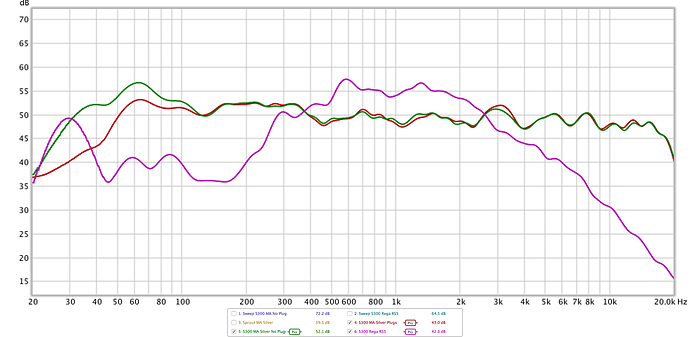I just bought a new set of speakers (Monitor Audio Silver 300) and while they have the bass I was looking for, they sound kind of muted and not nearly as lively as my old ones. So I decided to measure things (REW and UMIK-1) and see if I can figure out what’s going on. Here’s the result: frequency response with the old speakers (Rega RS5) in purple, the Monitor Audios in green (bass ports open) and red (bass ports plugged).
The old speakers have this amazing rise through the midrange that I never realized was there. The new speakers are really nice and flat, if a bit heavy in the bass – but that’s nothing compared to the 15dB bump in the midrange the old speakers have!
I’m essentially waiting for my ears to adapt to the new speakers, but I’m wondering if that bump is actually really pleasant and should be there. I just created a simple approximation of that in the DSP settings, and it does make things a bit livelier. But should I do that or see if I start to like the new speakers as they are?
That is how the Rega speakers are voiced. I would start by putting more hours on the new speakers. Then you can always add a little hump of your own to see what effect that has.
I just didn’t expect that to be that big a bump! I think my ears are starting to adapt, I listened to some jazz late last night and really enjoyed it. Some of the more bass-heavy electronic music still sounds off, though…
Congratulations on the new speakers. You can only tell so little from a frequency response chart, but from what I see, without knowing how you exactly measured, the new ones look almost perfect from a “flatness” perspective.
You might want to leave the plugs in to avoid that peak at 60Hz.
As you said, your brain needs time to adapt. Some weeks probably. Take that time. Listen closely.
And if then you still want to use EQ, from all what I know: lower the lows and highs to get the mids boosted, instead of raising the mids.
Enjoy!
I agree with the other comments here. I have some nice speakers but there was a room resonance that made a big bump, lower down than yours. Measured it. Then I did room correction and got rid of it. After a short time of acclimatization I love it, because of the clarity. The old hump also muddied things.
Give it some time.
Thanks! I was playing pink noise through the speakers and let REW average over 20 cycles or so. The chart you see is smoothed using REW’s psychoacoustic smoothing. That bump does make total sense from what I’m hearing, I’m just still shocked how much of a drop there is on both sides of the midrange with my old speakers.
Whenever new gear is introduced and especially something as big a change as speakers there is always a “burn in”.
For speakers there is definitely a mechanical kind of “burn in”, but in my experience a big part of it is also something else. Once mentioned by Rob Watts when it comes to digital audio: A lot of the burn in is probably your brain adapting to the changes in reproduction of the sound. I think that of most real changes in audio gear (tweaks left aside, too much nonsense there to even start).
It’s like when I was younger and prefered the kind of bass emphasised speakers and headphones (/EQ). Now I’m sworn towards correct reproduction and whenever I listen to the kind of gear I used to my head and ears almost hurts. I feel a kind of unease.
So just give it time and you will, as you already starting to, change your perception. After that you can choose if you like the change or not. The measuring of your new speakers looks almost perfect given most rooms are far from studio quality.
1 Like
That was the other surprise here, since the room is fairly large and has lots of parallel surfaces with few of them covered. I’m probably going to get some dampening at some point, but I expected there to be more of an effect on the upper midrange and treble from that.
I’m sure the “brain burn in” is not limited to digital; I remember when I upgraded the cartridge on my turntable, it sounded quite a bit brighter at first, but I got used to that pretty quickly and I felt that I could hear a lot more detail. That might also have been mechanical break-in, but I doubt that that was all of it.
